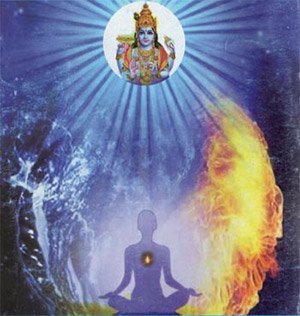Siddhanta Sangraha of Sri Sailacharya
by E. Sowmya Narayanan | 2008 | 30,562 words
Siddhanta Sangraha Chapter 20 (English translation), entitled “the supremacy of narayana” as included in the critical edition and study. The Siddhanta Samgraha is a Sanskrit philosophical text dealing with Vishishtadvaita in five hundred Sanskrit verses. It was written by Shri Shailacarya (18th century) and closely follows the philosophy of Vedanta Deshika (13th century).
Chapter 20 - The Supremacy of Nārāyaṇa
184. The expression Nārāyaṇa because of its etymological capability cannot otherwise convey any other deity other than Lord Nārāyaṇa, who is innately auspicious without any adventious conditions.
185. On the other hand, other expressions such as Śiva, Brahma, etc., through their etymological derivations will ultimately convey Lord Nārāyaṇa only by the maxim of sāmānya viśeṣa.[1]
186. In the same way the words such as satbrahma etc., in the causative statements of the śruti also describe
Viṣṇu or Nārāyaṇa. The statements which convey the jīvas such as Indra, also convey the Supreme, through the aspect namely, true import of the respective expressions (yogārtha śakti).
187. Though it is not explained as an indication of the Supreme through avayavārtha (through the meaning of its parts), by the scriptural statement ‘aṅgānyanyadevatāḥ’ (the other Gods are His limbs) the Gods namely Indra etc., indicate the Supreme Lord only. Therefore in the meditative worship (parāvidyā) of the Supreme Lordship of Lord Nārāyaṇa among other Gods is explained.
Footnotes and references:
[1]:
See Tattva Muktā Kalāpa, III-5
Conclusion:
 This concludes The Supremacy of Narayana according to Vishishtadvaita philosophy explained by Shri Shailacarya. This book follows the model of Vedanta Deshika although the Vishishta Advaita school was originally expounded by Shri Ramanuja. Vishishta-Advaita is one of the various sub-schools of Vedanta which itself represents one of the six orthodox schools of Hindu Philosophy. They highlight the importance of the Upanishads, the Bhagavad Gita and the Brahma Sutras.
This concludes The Supremacy of Narayana according to Vishishtadvaita philosophy explained by Shri Shailacarya. This book follows the model of Vedanta Deshika although the Vishishta Advaita school was originally expounded by Shri Ramanuja. Vishishta-Advaita is one of the various sub-schools of Vedanta which itself represents one of the six orthodox schools of Hindu Philosophy. They highlight the importance of the Upanishads, the Bhagavad Gita and the Brahma Sutras.
